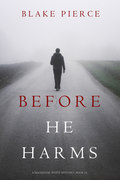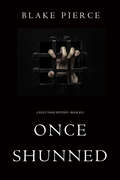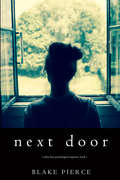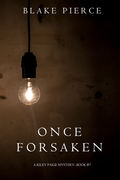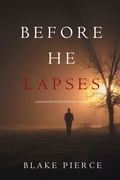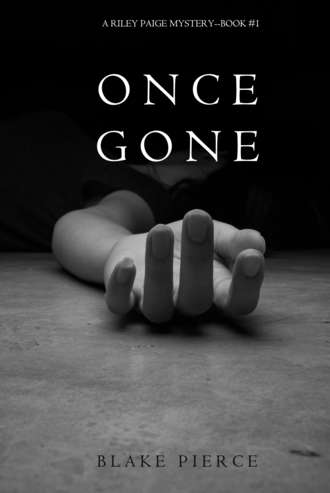
Блейк Пирс
Once Gone
Chapter 27
Hands still shaking, Riley reached into a kitchen cabinet for the bottle of vodka she’d stashed, the one she promised she would never touch again. She unscrewed the bottle cap and tried to pour it quietly into a glass, so that April wouldn’t hear. Since it looked so much like water, she hoped she could drink it openly without lying about it. She didn’t want to lie. But the bottle gurgled indiscreetly.
“What’s going on, Mom?” April asked from behind her at the kitchen table.
“Nothing,” Riley answered.
She heard April groan a little. She could tell that her daughter knew what she was doing. But there was no pouring the vodka back into the bottle. Riley wanted to throw it away, she really did. The last thing she wanted to do was drink, especially in front of April. But she had never felt so low, so shaken. She felt as if the world were conspiring against her. And she really needed a drink.
Riley slipped the bottle back into the cabinet, then went to the table and sat down with her glass. She took a long sip, and it burned her throat in a comforting way. April stared at her for a moment.
“That’s vodka, isn’t it, Mom?” she said.
Riley said nothing, guilt creeping over her. Did April deserve this? Riley had left her at home all day, calling occasionally to check up on her, and the girl had been perfectly responsible and had stayed out of trouble. Now Riley was the one being furtive and reckless.
“You got mad at me for smoking pot,” April said.
Riley still said nothing.
“Now is when you’re supposed to tell me that this is different,” April said.
“It is different,” Riley said wearily.
April glared.
“How?”
Riley sighed, knowing her daughter was right, and feeling a deepening sense of shame.
“Pot’s illegal,” she said. “This isn’t. And – ”
“And you’re an adult and I’m a kid, right?”
Riley didn’t reply. Of course, that was exactly what she had been starting to say. And of course, it was hypocritical and wrong.
“I don’t want to argue,” Riley said.
“Are you really going to start into this kind of thing again?” April said. “You drank so much when you were going through all those troubles – and you never even told me what it was all about.”
Riley felt her chin clench. Was it from anger? What on earth did she have to be angry with April about, at least right now?
“There are some things I just can’t tell you,” Riley said.
April rolled her eyes.
“Jesus, Mom, why not? I mean, am I ever going to be grown up enough to learn the awful truth about what you do? It can’t be much worse that what I imagine. Believe me, I can imagine a lot.”
April got up from her chair and stomped over to the cabinet. She pulled down the vodka bottle and started to pour herself a glass.
“Please don’t do that, April,” Riley said weakly.
“How are you going to stop me?”
Riley got up and gently took the bottle away from April. Then she sat down again and poured the contents of April’s glass into her own glass.
“Just finish eating your food, okay?” Riley said.
April was tearing up now.
“Mom, I wish you could see yourself,” she said. “Maybe you’d understand how it hurts me to see you like this. And how it hurts that you never tell me anything. It just hurts so much.”
Riley tried to speak but found that she couldn’t.
“Talk to somebody, Mom,” April said, beginning to sob. “If not to me, to somebody. There must be somebody you can trust.”
April fled into her room and slammed the door behind her.
Riley buried her face in her hands. Why did she keep failing so badly with April? Why couldn’t she keep the ugly parts of her life separate from her daughter?
Her whole body heaved with sobs. Her world had spun completely out of control and she couldn’t form a single coherent thought.
She sat there until the tears stopped flowing.
Taking the bottle and the glass with her, she went into the living room and sat on the couch. She clicked on the TV and watched the first channel that came up. She had no idea what movie or TV show she’d happened upon, and she didn’t care. She just sat there staring blankly at the pictures and letting the meaningless voices wash over her.
But she couldn’t stop the images flooding through her mind. She saw the faces of the women who had been killed. She saw the blinding flame of Peterson’s torch moving toward her. And she saw Marie’s dead face – both when Riley had found her hanging and when she’d been so artfully displayed in the coffin.
A new emotion started to crawl along her nerves – an emotion that she dreaded above all others. It was fear.
She was terrified of Peterson, and she could feel his vengeful presence all around her. It didn’t much matter whether he was alive or dead. He’d taken Marie’s life, and Riley couldn’t shake the conviction that she was his next target.
She also feared, perhaps even more, the abyss that she was falling into now. Were the two really separate? Hadn’t Peterson caused this abyss? This was not the Riley she knew. Did PTSD ever have an end?
Riley lost track of time. Her whole body buzzed and ached with her multifaceted fear. She drank steadily, but the vodka wasn’t numbing her at all.
She finally went to the bathroom and combed the medicine cabinet and found what she was looking for. Finally, with shaking hands, she found it: her prescription tranquilizers. She was supposed to take one at bedtime, and to never mix it with alcohol.
With shaking hands, she took two.
Riley went back to the living room couch and stared at the TV again, waiting for the medication to take effect. But it wasn’t working.
Panic seized her in an icy grip.
The room seemed to be spinning now, making her feel nauseous. She closed her eyes and stretched out on the couch. Some of the dizziness went away, but the darkness behind her eyelids was impenetrable.
How much worse can things get? she asked herself.
She knew right away that it was a stupid question. Things were going to get worse and worse and worse for her. Things would never ever get better. The abyss was bottomless. All she could do was surrender to the fall and give herself over to cold despair.
The pitch-blackness of intoxication folded itself around her. She lost consciousness and soon began to dream.
Once again, the white flame of the propane torch cut through the darkness. She heard someone’s voice.
“Come on. Follow me.”
It wasn’t Peterson’s voice. It was familiar, though – extremely familiar. Had somebody come to her rescue? She rose to her feet and began to follow whoever was carrying the torch.
But to her horror, the torch cast its light on one corpse after another – first Margaret Geraty, then Eileen Rogers, then Reba Frye, then Cindy MacKinnon – all of them naked and horribly splayed. Finally the light fell on Marie’s body, suspended in mid-air, her face horribly contorted.
Riley heard the voice again.
“Girl, you sure as hell botched things up.”
Riley turned and looked. In the sizzling glare, she saw who was holding the torch.
It wasn’t Peterson. It was her own father. He was wearing the full dress uniform of a Marine colonel. That struck her as odd. He’d been retired for many years now. And she hadn’t seen or spoken to him in more than two years.
“I saw some bad shit in ’Nam,” he said with a shake of his head. “But this really makes me sick. Yeah, you botched it bad, Riley. Of course I learned long ago not to expect anything from you.”
He waved the torch so that it shone on one last body. It was her mother, dead and bleeding from the bullet wound.
“You might as well have shot her yourself, for all the good you did her,” her father said.
“I was just a little girl, Daddy,” Riley wailed.
“I don’t want to hear any of your damn excuses,” her father barked. “You never brought a single human soul a moment of joy or happiness, you know that? You never did anybody a lick of good. Not even yourself.”
He turned the knob of the torch. The flame went out. Riley was in pitch-darkness again.
Riley opened her eyes. It was night, and the only light in the living room came from the TV. She remembered her dream clearly. Her father’s words kept ringing in her ears.
You never brought a single human soul a moment of joy or happiness.
Was it true? Had she failed everybody so miserably – even the people she loved most?
You never did anybody a lick of good. Not even yourself.
Her mind was foggy and she couldn’t think straight. Maybe she couldn’t bring anybody any real joy and happiness. Maybe there was simply no real love inside of her. Maybe she wasn’t capable of love.
On the verge of despair, reeling for a crutch, Riley recalled April’s words.
Talk to somebody. Somebody you can trust.
In her drunken haze, not thinking clearly, almost automatically Riley tapped a number on her cell phone. After a few moments, she heard Bill’s voice.
“Riley?” he asked, sounding more than half-asleep. “Do you know what time it is?”
“I’ve got no idea,” Riley said, slurring her words badly.
Riley heard a woman ask groggily, “Who is that, Bill?”
Bill said to his wife, “I’m sorry, I’ve got to take this.”
She heard the sound of Bill’s footsteps and a door closing. She guessed that he was going somewhere to talk privately.
“What’s this all about?” he asked.
“I don’t know, Bill, but – ”
Riley stopped for a moment. She felt herself on the brink of saying things that she’d regret – maybe forever. But somehow she couldn’t pull herself back.
“Bill, do you think you could get away for a while?”
Bill let out a growl of confusion.
“What are you talking about?”
Riley drew a deep breath. What was she talking about? She was finding it hard to collect her thoughts. But she knew that she wanted to see Bill. It was a primal instinct, an urge she could not control.
With what little awareness she had left she knew she should say I’m sorry and hang up. But fear, loneliness, and desperation overtook her, and she plunged ahead.
“I mean…” she continued, slurring her words, trying to think coherently, “just you and me. Spend some time together.”
There was only silence on the line.
“Riley, it’s the middle of the night,” he said. “What do you mean spend time together?” he demanded, his irritation clearly rising.
“I mean…” she began, searching, wanting to stop, but unable to. “I mean…I think about you, Bill. And not just at work. Don’t you think about me, too?”
Riley felt a terrible weight crushing upon her as soon as she had said it. It was wrong, and there was no taking it back.
Bill sighed bitterly.
“You’re drunk, Riley,” he said. “I’m not going to meet you anywhere. You’re not going to drive anywhere. I’ve got a marriage I’m trying to save, and you… well, you’ve got your own problems. Pull yourself together. Try to get some sleep.”
Bill ended the call abruptly. For a moment, reality seemed to hang in a state of suspension. Then Riley was seized by a horrible clarity.
“What have I done?” she whimpered aloud.
In but a few moments, she had thrown away a ten-year professional relationship. Her best friend. Her only partner. And probably the most successful relationship of her life.
She’d been sure that the abyss she’d fallen into had no bottom. But now she knew she was wrong. She’d hit the bottom, and shattered the floor. Still, she was falling. She didn’t know if she’d ever be able to get up again.
She reached for the vodka bottle on the coffee table – she didn’t know whether to drink the last of its contents or to pour it out. But her hand-eye coordination was completely shot. She couldn’t take hold of it.
The room swam around her, there came a crash, and everything went black.
Chapter 28
Riley opened her eyes, then squinted, shielding her face with her hand. Her head was splitting, her mouth dry. The morning light from the window was blinding and painful, reminding her uncannily of the white flash of Peterson’s torch.
She heard April’s voice say, “I’ll take care of that, Mom.”
There came a slight rattling and the glare diminished. She opened her eyes.
She saw that April had just closed the venetian blinds, shutting out the direct sunlight. She came over to the couch and sat down beside where Riley still lay. She picked up a cup of coffee and offered it to her.
“Careful, it’s hot,” April said.
Riley, the room spinning, slowly eased herself into a sitting position and reached for the mug. Handling the cup gingerly, she took a small sip. It was hot, all right. It burned both her fingertips and her tongue. Still, she was able to hold it, and she took another sip. At least the pain gave her a feeling of coming to life again.
April was staring off into space.
“Are you going to want some breakfast?” April asked in a distant, vacant voice.
“Maybe later,” Riley said. “I’ll fix it.”
April smirked a bit sadly. Doubtless she could see that Riley was in no condition to fix much of anything.
“No, I’ll do it,” April said. “Just let me know when you feel like eating.”
They both fell silent. April kept on staring elsewhere. Humiliation gnawed at Riley’s gut. She vaguely remembered her disgraceful phone call to Bill last night, then her last thoughts before passing out – that hideous knowledge that she’d truly hit rock bottom. And now, to make matters worse, her daughter was here to witness her ruin.
Still sounding distant, April asked, “What are you planning to do today?”
It seemed both an odd question and a good one. It was time for Riley to make plans. If this was rock bottom, she needed to start pulling herself out.
She flashed back to her dream, her father’s words, and as she did, she realized it was time to confront some of her demons.
Her father. The darkest presence of her life. The one who had always lingered in the back of her consciousness. The driving force, she sometimes felt, behind all the darkness she had manifested in her life. He, of all people, was the one she needed to see. Whether it was a primal urge for a father’s love, her urge to face head-on the darkness in her life, or a desire to shake off being haunted by her dream, she did not know. But the urge consumed her.
“I think I’ll drive out to see Grandpa,” she said.
“Grandpa?” she asked, shocked. “You haven’t seen him for years. Why would you go see him? I think he hates me.”
“I don’t think so,” Riley said. “He’s always been too busy hating me.”
Another silence fell, and Riley sensed that her daughter was gathering her resolve.
“I want you to know something,” April said. “I dumped out the rest of the vodka. There wasn’t much left. I also poured out the whiskey you still had in the cabinet. I’m sorry. I guess it was none of my business. I shouldn’t have done that.”
Tears came to Riley’s eyes. This was surely the most grown-up and responsible thing she’d ever known April to do.
“No, you should have,” Riley said. “It was the right thing to do. Thank you. I’m sorry I couldn’t do it myself.”
Riley wiped away a tear and gathered up her own resolve.
“I think it’s time we really talked,” Riley said. “I think it’s time I told you some of the things you’ve wanted me to tell you.” She sighed. “But it won’t be pleasant.”
April finally turned and looked at her, anticipation in her eyes.
“I really wish you would, Mom,” she said.
Riley took a long, deep breath.
“A couple of months back, I was working on a case,” she said. Relief poured through her as she began to tell April about the Peterson case. She realized that this was much too long overdue.
“I got too eager,” she continued. “I was by myself and I came across a situation, and I wasn’t willing to wait. I didn’t call for backup. I thought I could take care of it by myself.”
April said, “That’s what you do all the time. You try to take care of everything alone. Without me even. Without even talking to me.”
“You’re right.”
Riley steeled herself.
“I got Marie out of captivity.”
Riley hesitated, then finally plunged ahead. She heard her own voice shaking.
“I got caught,” she continued. “He held me in a cage. There was a torch.”
She broke down crying, all her pent-up terror rushing to the surface. She was so embarrassed, but couldn’t stop.
To her surprise, she felt April’s reassuring hand on her shoulder, and heard April crying herself.
“It’s okay, mom,” she said.
“They couldn’t find me,” Riley continued, between sobs. “They didn’t know where to look. It was my fault.”
“Mom, nothing’s your fault,” April said.
Riley wiped away her tears, trying to get a hold of herself.
“Finally, I got away finally. I blew up the place. They say the man is dead. That he can’t hurt me now.”
There came a silence.
“Is he?” April asked.
Riley so desperately wanted to say yes, to reassure her daughter. But instead she found herself saying:
“I don’t know.”
The silence thickened.
“Mom,” April said, a new tone to her voice, one of kindness, of compassion, of strength, one Riley had never heard before, “you saved someone’s life. You should be so proud of yourself.”
Riley felt a new dread as she slowly shook her head.
“What?” April asked.
“That’s where I was yesterday,” Riley said. “Marie. Her funeral.”
“She’s dead!?” she asked, flabbergasted.
Riley could only nod.
“How?”
Riley hesitated. She didn’t want to say it, but she had no choice. She owed April the whole truth. She was done withholding things.
“She killed herself.”
She heard April gasp.
“Oh, Mom,” she said, crying. “I’m so, so sorry.”
They both cried for a long, long time, until finally they settled into a relaxed silence, each spent.
Riley took a deep breath, leaned over, and smiled at April, pulling the hair off her wet cheeks with love.
“You’ll have to understand that there will be things I can’t tell you,” Riley said. “Either because I can’t tell anybody, or because it wouldn’t be safe for you to know, or maybe just because I don’t think you should be thinking about them. I have to learn how to be the mother here.”
“But something as big as this,” April said. “You should have told me. You’re my mother, after all. How was I supposed to know what you were going through? I’m old enough. I can understand. “
Riley sighed.
“I guess I thought you had enough to worry about. Especially with Dad and I splitting up.”
“The split wasn’t as hard as having you not talk to me,” April countered. “Dad’s always ignored me except when he felt called upon to give orders. But you – it’s like suddenly you weren’t there anymore.”
Riley took April’s hand and squeezed it tightly.
“I’m sorry,” Riley said. “For everything.”
April nodded.
“I’m sorry too,” she said.
They hugged, and as Riley felt April’s tears flow down her neck, she vowed to be different. She vowed to make a change. When this case was behind her, she would become the mother she always wanted to be.
Chapter 29
Riley drove reluctantly into the heart of her early childhood. What she expected to find there she didn’t know. But she knew this was a crucial errand – for herself, anyway. She braced herself at the idea of seeing her father. Yet she knew she needed to face him.
Sloping all around her were the Appalachian Mountains, far to the south of her recent investigations. The trip down here had been a tonic in some ways, and with the windows down, she was beginning to feel better. She’d forgotten how beautiful the Shenandoah Valley was. She found herself steering upward through rocky passes and alongside flowing streams.
She passed through a typical mountain town – little more than a cluster of buildings, a gas station, a grocery store, a church, a handful of houses, a restaurant. She remembered how she’d spent her earliest childhood years in a town much like this.
She also remembered how sad she’d been when they’d moved to Lanton. Mother had said it was because it was a university town and had a whole lot more to offer. That had reset Riley’s life expectations when she was still very young. Might things have gone better if she’d been able to spend her whole life in this simpler and more innocent world? A world where her mother wasn’t likely to get gunned down in a public place?
The town disappeared behind her in multiple curves of the mountain roads. After a few miles, Riley turned off onto a winding dirt road.
Before too long she arrived at the cabin her father had bought after retiring from the Marines. A battered old utility vehicle was parked nearby. She hadn’t been here in more than two years, but she knew the place well.
She parked and got out of her car. As she walked toward the cabin, she breathed in the clean forest air. It was a beautiful sunny day, and at this altitude the temperature was cool and pleasant. She basked in the splendid quiet, broken by nothing more than bird songs and the rustle of leaves in the breeze. It felt good to be surrounded on all sides by deep forest.
She walked toward the door, past a tree stump where her father cut his firewood. There was a pile of wood nearby – his only source of heat in colder weather. He also lived without electricity, but spring water was piped into the cabin.
Riley knew that this simple life was a matter of choice, not poverty. With his excellent benefits, he could have retired anywhere he’d liked. He’d chosen here, and Riley couldn’t blame him. Maybe someday she’d do the same. Of course, a substantial pension looked markedly less likely, now that she’d lost her badge.
She pushed at the door and it opened freely. Out in these parts, there was little to fear from intruders. She stepped inside and looked around. The spare but comfortable single room was dim, with several unlit gas lanterns here and there. The pine paneling gave off a warm and pleasant woody smell.
Nothing had changed since the last time she’d been here. There were still no mounted deer heads or any other signs of game animals. Her father killed more than his share of animals, but solely for food and clothing.
The quiet was broken by a gunshot outside. She knew it wasn’t deer season. He was probably shooting at smaller game – squirrels, crows, or groundhogs. She left the cabin and walked uphill past the smokehouse where he stored his meat, then followed a trail into the woods.
She passed by the covered spring that his fresh water came from. She arrived at the edge of what remained of an old apple orchard. Small lumpy fruit hung from the trees.
“Daddy!” she called out.
No reply came. She pushed on into the overgrown orchard. Soon she saw her father standing nearby – a tall, gangly man wearing a hunting cap and a red vest and holding a rifle. Three dead squirrels lay at his feet.
He turned his lined, hard, weathered face toward her, looking not the least bit surprised to see her – and not the least bit pleased.
“You shouldn’t be up here without a red vest, girl,” he growled. “Lucky thing I didn’t shoot you dead.”
Riley didn’t reply.
“Well, there’s nothing out here to shoot now,” he said irritably, unloading his gun. “You’ve run them all off, with your yelling and crashing through the brush. At least I’ve got squirrels for dinner.”
He started to walk downhill toward his cabin. Riley followed after him, barely able to keep up with his long, swift strides. After years of retirement, he still walked with his old military bearing, his whole body coiled like a huge steel spring.
When they got to the cabin, he didn’t invite her in, nor did she expect him to. Instead, he tossed the squirrels into a basket by the door, then walked over to the stump near the woodpile and sat there. He took off his cap, revealing gray hair that was still cropped short, Marine-style. He didn’t look at Riley.
With no place else to sit, Riley plopped down on the front steps.
“It looks nice inside your cabin,” she said, trying to find something to talk about. “I see you’re still not mounting trophies.”
“Yeah, well,” he said with smirk, “I never took trophies when I killed in ’Nam. I’m not going to start now.”
Riley nodded. She’d heard this remark often, always delivered with his typical grim humor.
“So what are you doing here?” her father asked.
Riley started to wonder. What on earth had she expected from this hard man, so incapable of basic affection?
“I’ve got some troubles, Daddy,” she said.
“With what?”
Riley shook her head and smiled sadly. “I don’t know where to start,” she said.
He spit on the ground.
“It was a damn fool thing you did, getting caught by that psychopath,” he said.
Riley was surprised. How did he know? She’d had no communication with him for a year.
“I thought you lived completely off the grid,” she said.
“I get into town from time to time,” her father said. “I hear things.”
She almost said that her “damn fool thing” had saved a woman’s life. But she quickly remembered – that wasn’t true at all, not in the long run.
Still, Riley found it interesting that he knew about this. He’d actually gone to the trouble to find out something that had happened to her. What else might he know about her life?
Probably not much, she thought. Or at least nothing I’ve done right according to his standards.
“So did you fall to pieces after that whole thing with the killer?” he asked.
Riley bristled at this.
“If you mean did I suffer from PTSD, yes, I did.”
“PTSD,” he repeated, chuckling cynically. “I can’t even remember just what those damn letters stand for. Just a fancy way of saying you’re weak, as far as I’m concerned. I never suffered from this PTSD thing, not after I got home from the war, not after all the stuff I saw and did and got done to me. Don’t see how anybody gets away with using that as an excuse.”
He fell silent, looking off into space as if she weren’t there. Riley figured this visit wasn’t going to end well. She might as well talk a little about what was going on in her life. He wouldn’t have anything encouraging to say about it, but at least it would make conversation.
“I’m having trouble with a case, Daddy,” she said. “It’s another serial killer. He tortures women, strangles them, and poses them outdoors.”
“Yeah, I heard about that too. Poses them naked. Sick business.” He spit again. “And let me guess. You’re at odds with the Bureau about it. The powers-that-be don’t know what they’re doing. They won’t listen to you.”
Riley was startled. How did he guess?
“It was the same with me in ’Nam,” he said. “The brass didn’t seem to even get that they were fighting a damn war. Christ, if they’d left it up to the likes of me, we’d have won it. Makes me sick to think about it.”
Riley heard something in his voice that she hadn’t heard often – or at least had seldom noticed. It was regret. He actually felt regret about not winning the war. It didn’t matter that he was in no way to blame. He felt responsible.
As Riley studied his face she realized something. She looked like him, more than she’d looked like her mother. But it was more than that. She was like him – not just in her horrible way with relationships, but with her cussed determination, her overweening sense of responsibility.
And that wasn’t altogether a bad thing. In this rare moment of felt kinship, she wondered if maybe he really could tell her something she needed to know.
“Daddy, what he does – it’s so ugly, leaving bodies naked and so horribly posed, but – ”
She stopped, trying to find the right words.
“The places he leaves them are always so beautiful – forests and creeks, natural scenes like that. Why do you suppose he picks such places do something so ugly and evil?”
Her father’s eyes turned inward. He seemed to be exploring his own thoughts, his own memories, talking as much about himself as about anybody else.
“He wants to start all over again,” he said. “He wants to go all the way back to the beginning. Isn’t it the same with you? Don’t you just want to go back to where you started and begin all over again? Go back to where you were a kid? Find the place where everything went wrong and make life go all different?”
He paused for a moment. Riley remembered her thoughts driving here – how sad she’d been as a little girl when she’d had to leave these mountains. There really was some elemental truth in what her father was saying.
“That’s why I live here,” he said, slipping deeper into reverie.
Riley sat there quietly, taking this in. Her father’s words started to bring something into focus. She’d long assumed that the killer kept and tortured the women in his childhood home. It hadn’t occurred to her that he chose that setting for a reason – to somehow reach back into his past and change everything.
Still not looking at her, her father asked, “What does your gut tell you?”
“It’s something to do with dolls,” Riley said. “It’s something that the Bureau’s not getting. They’re chasing after everything wrong. He’s obsessed with dolls. That’s the key somehow.”
He grunted and shuffled his feet.
“Well, you just keep following that gut of yours,” he said. “Don’t let the bastards tell you what to do.”
Riley was dumbstruck. It wasn’t as if he were paying her a compliment. It wasn’t as if he meant to be nice. He was the same irascible jerk he’d always been. But somehow, he was saying exactly what she needed to hear.
“I’m not going to quit,” she said.
“You’d damn well better not quit,” he snarled in a whisper.
There was nothing more to say. Riley got to her feet.
“It was good to see you, Daddy,” she said. And she actually halfway meant it. He didn’t reply, just sat there looking at the ground. She got into her car and drove away.
As she drove, she realized that she felt different from when she’d come – and in some odd way, much better. Something, she felt, had been resolved between them.
She also knew something that she hadn’t known before. Wherever the killer lived, it wasn’t in some tenement, some sewer, or even some wretched, rundown shack out in the woods somewhere.
It was going to be a place of beauty – a place where beauty and horror were poised equally, side by side.
* * *
A little while later, Riley was sitting at the counter in a cafe in the town nearby. Her father had offered her nothing to eat, which was no surprise, and now she was hungry and needed some nutrition for the drive home.
Just when the waitress set her bacon, lettuce, and tomato sandwich on the counter in front of her, Riley’s cell phone buzzed. She looked to see who was calling, but there was no identification. She took the call warily.
“Is this Riley Paige?” asked a woman with an efficient voice.



